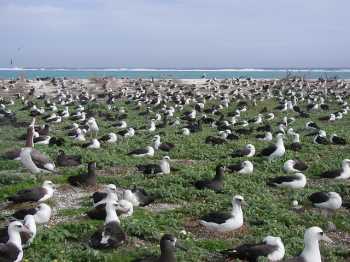Accurate estimation of numbers is critical for determining conservation status and for identifying key factors influencing changes in population size and demography of seabirds. ACAP has now produced draft guidelines for counting albatrosses and petrels. The 13-page document (BSWG4/STWG6 Doc 06) was considered at the recent Joint Meeting of ACAP's Breeding Sites and Status & Trends Working Groups held last month in Guayaquil, Ecuador. It has been co-authored by Anton Wolfaardt (Joint Nature Conservation Committee) and Richard Phillips (British Antarctic Survey) of the United Kingdom.
A range of different methods has been used to count surface-breeding ACAP-listed species including ground counts and scans, transect and quadrat sampling to estimate densities, which are then extrapolated to larger areas, aerial photographs from both fixed- and rotary-winged aircraft, and boat-based photography of cliff sites.
The purpose of the guidelines document is to provide guidelines to assist ACAP Parties in the development and implementation of plans to count ACAP species. It focuses mostly on surface-breeding species, but also includes some guidelines for surveying burrow-nesting species.
The Joint Working Group agreed that the guidelines document will be a valuable practical resource for Parties, and asked the authors, working with the ACAP Secretariat, to update the document based on the inputs received at the meeting. Once the document has been revised it will be made available on the ACAP website as one of the series of ACAP Conservation Guidelines. Two of these, on Biosecurity and on Eradication, are already available on the web site for consultation (click here).

John Cooper, ACAP Information Officer, 8 September 2011

 English
English  Français
Français  Español
Español